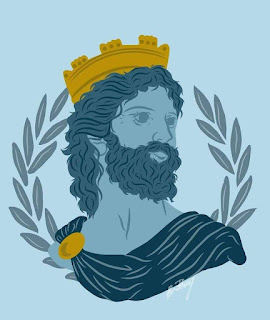The control of the sky and the father of all
Zeus was the main divinity of the Greek pantheon, and is certainly one of the oldest gods, with his cult attested in Bronze Age Greece with a mention on the Linear B tablets.
He has a distinct Indo European origin, with his name deriving from the root “dieu”, meaning day and from the ancient sky god “Dyaus” mentioned in the Rigveda (Sanskrit hymns). This was an appropriate name for Zeus who was also a god that dominated the heavens and was seen as a symbol of light, and creator of all. Indeed, as god of the bright sky, the ancient Greeks linked him to the weather and made a mountain top a specific place for his worship.
In Homer, Zeus is both father, πατήρ, and king or lord. His paternal side is evident on his temple in Olympia, where he is closely linked to his son Herakles whose labours form the metopes.
Zeus as king
Most Greek sources display Zeus as a king, not a tyrant. His main domain is right and justice. Any transgressions of his order is dealt with through divine justice. Thus the suitors in the Odyssey are compelled to suffer for their inhospitable behaviour, with xenia (hospitality) being yet another example of Zeus’ attributes.
However, Zeus is corruptible with his power: He deposed of his father Cronus who had also castrated his father Uranus. Among Zeus’ formidable display of total power, is the famous punishment given to Prometheus for stealing the Olympian fire, where he was forcibly chained to a rock so that his liver could be removed day after day. This tyrannical style of behaviour is promoted by Ovid in his Metamorphoses where the Roman Zeus, Jupiter, rules with oppression.
Zeus the protector
The Greek word for fence is herkos, and herkeiosis was a further epithet of Zeus. According to Homer, the altar of Zeus Herkeios generally stood in the courtyard before the house, where sacrifices and libations were offered to him and in return he would provide valuable protection to the oikos, house.
•
These are just a few of Zeus’ guises. He in fact has many more! From saviour figure to protector of friendship. He was also omnipotent, omniscient and omnipresent….as his mythol
ogy accentuates.





No comments:
Post a Comment